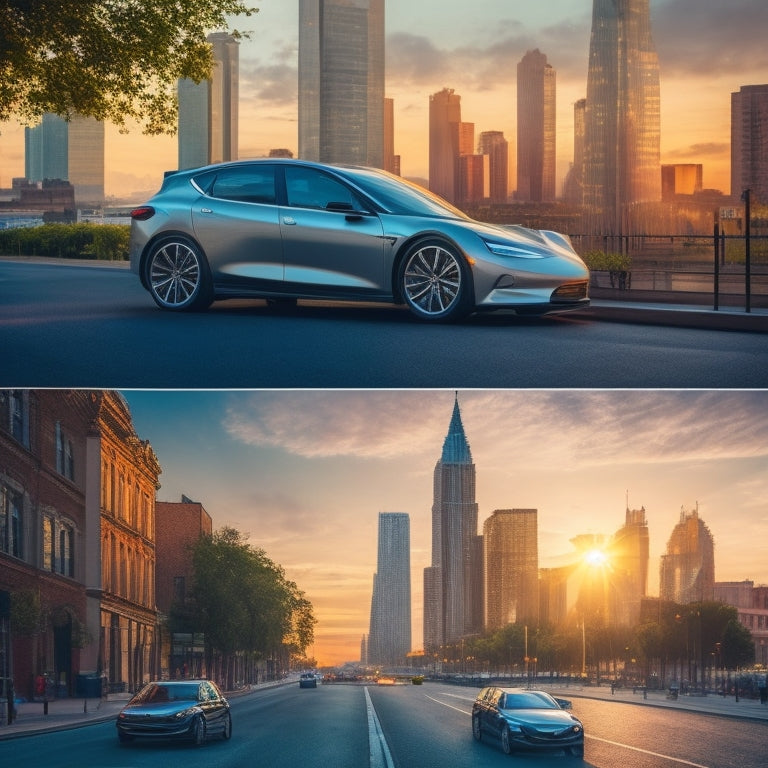
Electric Vehicles: Pros and Cons Unveiled
Share
Electric vehicles (EVs) have emerged as a promising alternative to traditional internal combustion engine vehicles, offering a unique combination of environmental benefits, improved performance, and reduced operating costs. With zero tailpipe emissions, EVs eliminate environmental worries, while advancements in charging technology provide convenience. Long-term savings on maintenance and fuel costs, coupled with ongoing innovations in battery technology, make EVs a compelling choice. As the industry continues to evolve, further advancements in range, performance, and efficiency are expected, paving the way for a sustainable transportation future - and there's more to explore on the EV landscape.
Key Takeaways
• Electric Vehicles offer zero tailpipe emissions, reducing environmental impact and promoting a sustainable transportation future.
• Lower maintenance costs and reduced fuel expenses provide long-term savings for EV owners.
• Fast-charging solutions reduce wait times, making EVs a more practical option for daily use.
• Regular maintenance is still necessary, including tire pressure, brake pad, and battery health checks.
• Ongoing innovations in battery technology drive improvements in range, performance, and efficiency, making EVs more competitive.
Electric Vehicle Essentials
Two primary categories of electric vehicles exist: those that are powered solely by a battery, known as Battery Electric Vehicles (BEVs), and those that combine a conventional internal combustion engine with an electric motor, referred to as Hybrid Electric Vehicles (HEVs) and Plug-in Hybrid Electric Vehicles (PHEVs).
Understanding these categories is crucial for making informed decisions about electric vehicle ownership. When it comes to charging solutions, BEVs require a charging station or wall connector, while HEVs and PHEVs can utilize regenerative braking to recharge their batteries.
Regular vehicle maintenance is also essential, including checks on tire pressure, brake pads, and battery health.
Weighing the Pros and Cons
As electric vehicle ownership becomes increasingly viable, a thorough examination of the advantages and disadvantages of these vehicles is necessary to make informed purchasing decisions.
To weigh the pros and cons, consider the following key points:
-
Environmental benefits: Electric vehicles offer a reduced environmental impact through zero tailpipe emissions, making them an attractive option for eco-conscious consumers.
-
Charging solutions: Advancements in charging technology have improved convenience, with fast-charging solutions reducing wait times.
-
Cost analysis: While the initial purchase price may be higher, electric vehicles offer long-term savings through lower maintenance costs and reduced fuel expenses.
- Technological advancements: Ongoing innovations in battery technology are driving improvements in range, performance, and overall efficiency.
The Road Ahead for EVs
The electric vehicle landscape is poised for significant transformation, driven by ongoing innovations in battery technology, expanding charging infrastructure, and evolving government policies.
As the industry continues to evolve, future innovations are expected to focus on improving range, efficiency, and affordability. The expansion of charging infrastructure will play an essential role in addressing range anxiety and increasing adoption rates.
Governments are also likely to introduce more incentives and policies to encourage the adoption of electric vehicles. With ongoing advancements in battery technology, electric vehicles are poised to become even more competitive with their internal combustion engine counterparts.
As the industry continues to mature, we can expect to see significant growth and increased adoption of electric vehicles in the years to come.
Frequently Asked Questions
Can Electric Vehicles Be Charged Using a Standard Household Outlet?
Can we truly harness the power of electric vehicles without convenient charging options? Yes, electric vehicles can be charged using a standard household outlet, but beware of slower charging speeds and outlet safety considerations.
Do Electric Vehicles Have a Limited Lifespan Due to Battery Degradation?
Battery degradation is a concern, as electric vehicles' lifespans are affected by factors like charging cycles and battery health, with most manufacturers estimating a 10-15 year lifespan, depending on usage and maintenance practices.
Are Electric Vehicles More Prone to Fires Than Gasoline-Powered Cars?
Research suggests that electric vehicles are not inherently more prone to fires than gasoline-powered cars, thanks to built-in safety features, such as thermal management systems, that mitigate fire risks and guarantee overall vehicle safety.
Can Electric Vehicles Be Recycled at the End of Their Life Cycle?
At the end of their life cycle, electric vehicles can be recycled through closed-loop systems, where manufacturers assume design responsibility, ensuring responsible disposal and reuse of materials, minimizing waste and promoting sustainability.
Do Electric Vehicles Require Specialized Maintenance or Repairs?
According to a study, 75% of electric vehicle owners opt for dealership servicing, highlighting the need for specialized maintenance. Electric vehicles require unique diagnostic tools and repair certification, ensuring technicians are equipped to handle complex electrical systems and high-voltage components.
Related Posts
-

What Do Power Strips Do for Standby Energy?
You're likely aware that your devices, such as TVs and computers, continue to draw power even when turned off, a phen...
-

10 Green Waste Solutions Every Homeowner Should Know
You can make a significant impact on the environment by implementing green waste solutions at home. Consider composti...
-

3 Eco-Friendly Automated Blinds for Contemporary Living
You're looking to raise your living space with automated blinds that not only exude contemporary style but also align...


